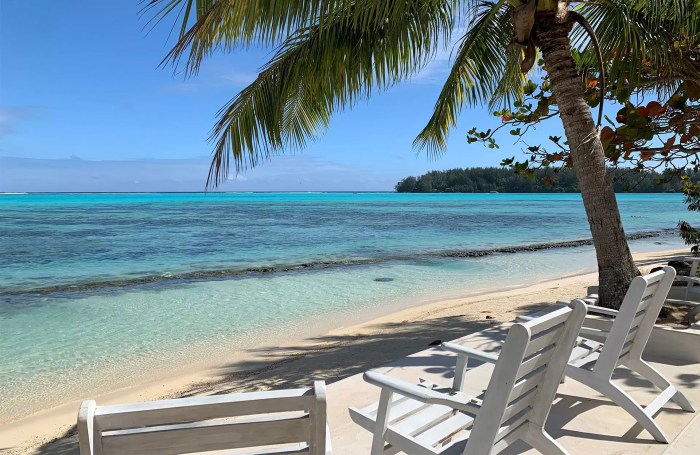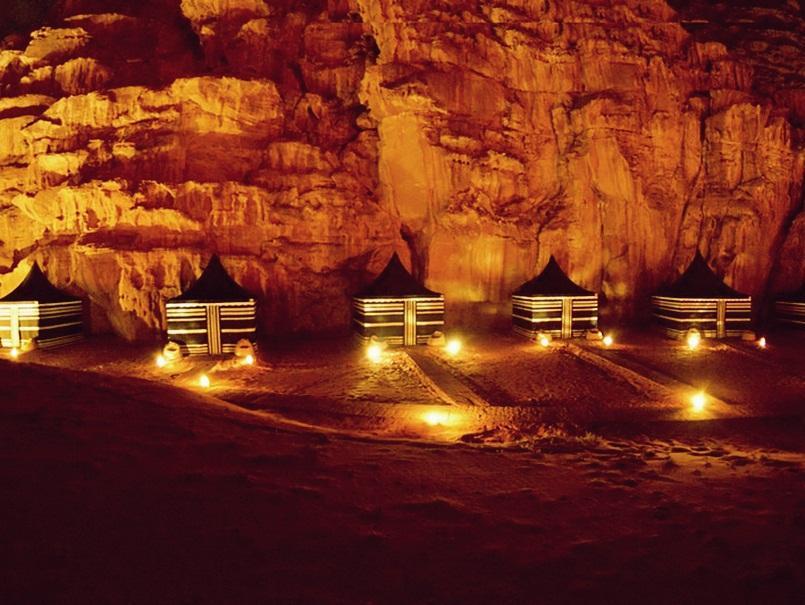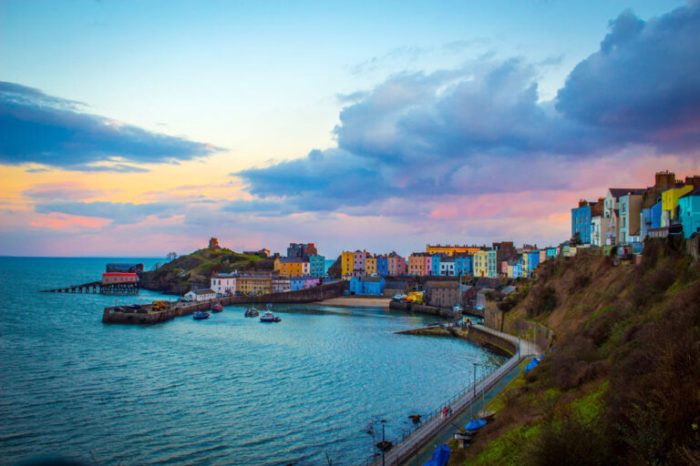Durban Holiday: A Cultural Tapestry and Coastal Paradise invites you to explore the vibrant city of Durban, South Africa, where rich cultural heritage intertwines with breathtaking beaches and endless entertainment. From its captivating Indian and Zulu influences to its colonial past, Durban’s cultural identity is a symphony of diverse traditions.
Immerse yourself in the city’s street art scene, where vibrant murals tell stories of Durban’s past and present.
Prepare to be captivated by Durban’s must-visit tourist attractions. Stroll along the iconic Golden Mile, a promenade lined with golden sands and crashing waves. Dive into the underwater wonders of uShaka Marine World, home to a mesmerizing array of marine life.
Ascend to the Moses Mabhida Stadium, an architectural marvel that offers breathtaking panoramic views of the city and coastline.
Durban’s Cultural Heritage
Durban is a melting pot of cultures, with a rich heritage influenced by its Indian and Zulu communities. The city’s colonial past has also left an indelible mark on its cultural identity.
Indian Influence
- The arrival of Indian indentured laborers in the 19th century brought a vibrant Indian culture to Durban.
- Today, the city’s large Indian population has preserved many of its traditions, including its cuisine, music, and dance.
- The Victoria Street Market is a bustling hub of Indian culture, offering a wide variety of spices, fabrics, and jewelry.
Zulu Influence
- The Zulu people are the indigenous inhabitants of the Durban area.
- Their culture is characterized by its strong sense of community, its vibrant music and dance, and its traditional crafts.
- The KwaZulu-Natal Museum houses a vast collection of Zulu artifacts, providing visitors with a glimpse into this rich culture.
Colonial Influence
- Durban was founded by British colonists in the early 19th century.
- The city’s colonial architecture reflects its European heritage, with buildings such as the Durban City Hall and the Emmanuel Cathedral.
- The colonial period also saw the establishment of Christian missions, which played a significant role in shaping Durban’s religious landscape.
Street Art
In recent years, Durban has emerged as a vibrant hub for street art. Local and international artists have created a diverse collection of murals and graffiti that adorn the city’s walls.
This street art reflects the city’s cultural diversity and its commitment to social justice. It has become an integral part of Durban’s identity, transforming public spaces into canvases for artistic expression.
Must-Visit Tourist Attractions
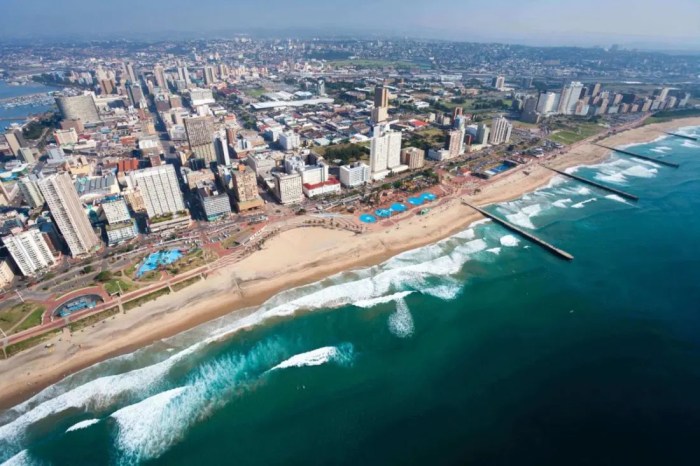
Durban is a vibrant city with a diverse range of attractions that cater to every taste and preference. From iconic landmarks to world-class entertainment venues, there’s something for everyone to enjoy. Here’s a detailed guide to some of the must-visit tourist attractions in Durban:
The Golden Mile
The Golden Mile is a 6-kilometer stretch of beach that is considered the heart of Durban’s tourism industry. It’s a popular spot for swimming, sunbathing, and surfing, and it’s also home to a variety of restaurants, bars, and shops. The Golden Mile is also the starting point for the Durban Mini Town, a miniature replica of the city that’s a popular attraction for families.
uShaka Marine World
uShaka Marine World is one of the largest marine theme parks in the world. It’s home to a variety of marine animals, including dolphins, sharks, penguins, and seals. The park also has a variety of rides and attractions, including a water park, an aquarium, and a dolphinarium.
uShaka Marine World is a great place to learn about marine life and have some fun at the same time.
Moses Mabhida Stadium
Moses Mabhida Stadium is a world-class sports stadium that was built for the 2010 FIFA World Cup. The stadium has a capacity of over 60,000 people and it’s a popular venue for major sporting events. The stadium also has a variety of other attractions, including a skywalk that offers stunning views of the city.
Durban’s Beaches and Coastal Activities
Durban boasts a stunning coastline with golden sands and warm waters, making it a paradise for beachgoers. The city’s beaches offer a wide range of water sports and activities, catering to every taste and preference.
Water Sports and Activities
Durban’s beaches are renowned for their excellent surfing conditions, with waves suitable for both beginners and experienced surfers. Other popular water sports include swimming, paddleboarding, and kayaking. The warm waters and gentle currents make these activities accessible and enjoyable for people of all ages.
- Surfing:Durban is home to several world-class surf spots, including North Beach, South Beach, and Addington Beach.
- Swimming:The beaches are patrolled by lifeguards, ensuring safety for swimmers. Designated swimming areas are marked with flags.
- Paddleboarding:Stand-up paddleboarding is a great way to explore the coastline and enjoy the scenic views.
- Kayaking:Kayaking is another popular activity, allowing visitors to venture further out into the ocean and explore hidden coves.
Beach Amenities
Durban’s beaches are well-equipped with amenities to enhance the visitor experience. These include changing rooms, showers, toilets, and picnic areas. Many beaches also have restaurants, cafes, and shops, offering a convenient and enjoyable day out by the sea.
A map or interactive graphic showcasing the different beaches and their amenities can be found on the Durban Tourism website.
Local Cuisine and Dining
Durban’s culinary scene is a vibrant tapestry of flavors, reflecting the city’s diverse cultural heritage. From the aromatic curries of Indian cuisine to the hearty dishes of Zulu tradition, Durban offers a tantalizing array of culinary delights that cater to every palate.
Indian Cuisine
Indian cuisine has left an indelible mark on Durban’s food culture. Local restaurants serve authentic Indian dishes with a Durban twist, often incorporating local ingredients and flavors. Some popular Indian dishes to try include:
- Bunny Chow: A hollowed-out loaf of bread filled with curry
- Samoosas: Triangular pastries filled with vegetables or meat
- Durban Curry: A spicy and flavorful curry made with a blend of spices
Zulu Cuisine
Zulu cuisine is another integral part of Durban’s culinary heritage. Traditional Zulu dishes often feature hearty stews, grilled meats, and fresh vegetables. Some popular Zulu dishes to try include:
- Umleqwa: A spicy stew made with tripe, vegetables, and herbs
- Chakalaka: A relish made with tomatoes, onions, peppers, and spices
- Umngqusho: A porridge made with samp and beans
International Cuisine
Durban also offers a wide variety of international cuisine, including Italian, Chinese, Portuguese, and Greek. Many restaurants cater to the diverse tastes of Durban’s residents and visitors, offering a range of dishes from around the world.
Street Food
Durban’s street food scene is not to be missed. Vendors sell a variety of snacks and treats, from traditional Indian street food to modern fusion dishes. Some popular street food items to try include:
- Roti Rolls: Flatbreads filled with various fillings
- Vetkoek: Deep-fried dough balls
- Gatsby: A sandwich filled with chips, meat, and various toppings
Dining Recommendations
Here are a few recommended restaurants in Durban for an authentic culinary experience:
- The Curry Den: Known for its authentic Indian curries
- Butcher Block: A popular steakhouse serving grilled meats and seafood
- The Ocean Basket: A seafood restaurant with a wide selection of fresh seafood dishes
- Wimpy: A fast-food chain serving burgers, fries, and other American-style dishes
- Shisa Nyama: A traditional Zulu restaurant specializing in grilled meats
Accommodation Options
Durban offers a wide range of accommodation options to suit every budget and preference. From luxury hotels with world-class amenities to budget-friendly guesthouses, there’s something for everyone in this vibrant city.
The city center is home to many of Durban’s most luxurious hotels, including the five-star Hilton Durban and the Oyster Box Hotel. These hotels offer stunning views of the Indian Ocean, spacious rooms, and a full range of amenities. For those on a tighter budget, there are several affordable options in the city center, such as the Garden Court Marine Parade and the Protea Hotel by Marriott Durban Edward.
When planning a Durban holiday in November, consider exploring the Caribbean. With its warm waters and stunning beaches, the Caribbean offers a perfect escape from the hustle and bustle of city life. If you’re unsure which island to visit, check out this guide to the best Caribbean islands to visit in November.
After soaking up the Caribbean sun, return to Durban refreshed and rejuvenated, ready to embrace the vibrant energy of this coastal metropolis.
The beachfront is another popular area to stay in Durban. Here, you’ll find a variety of hotels and guesthouses ranging from budget-friendly to mid-range. Many of these properties offer direct access to the beach, making them ideal for those who want to spend their days swimming, sunbathing, and surfing.
If you’re looking for a more relaxed and laid-back atmosphere, consider staying in one of Durban’s suburbs. Umhlanga Rocks is a popular choice, with its beautiful beaches, upscale shopping, and lively nightlife. Other popular suburbs include Berea, Glenwood, and Morningside.
Popular Hotels in Durban
| Hotel | Location | Amenities | Price Range |
|---|---|---|---|
| Hilton Durban | City center | Ocean views, rooftop pool, fitness center, spa | $200-$400 per night |
| Oyster Box Hotel | Umhlanga Rocks | Private beach, multiple pools, fine dining, golf course | $300-$600 per night |
| Garden Court Marine Parade | City center | Ocean views, pool, restaurant, free Wi-Fi | $100-$150 per night |
| Protea Hotel by Marriott Durban Edward | City center | Pool, fitness center, free breakfast | $80-$120 per night |
| The Edward Hotel | Umhlanga Rocks | Ocean views, rooftop pool, spa, fitness center | $150-$250 per night |
Nightlife and Entertainment
Durban boasts a vibrant nightlife scene that caters to various tastes and preferences. From bustling nightclubs and trendy bars to live music venues and cultural hubs, the city offers a diverse range of entertainment options.
The city center is a hub for nightlife, with many popular clubs and bars located along popular streets like Florida Road and Umgeni Road. These venues offer a lively atmosphere, with DJs spinning the latest tunes and a mix of locals and tourists dancing the night away.
Live Music Venues
Durban is also home to a thriving live music scene, with venues showcasing a wide range of genres. The BAT Centre (formerly known as the Elizabeth Sneddon Theatre) is a renowned venue that hosts local and international musicians, while The Chairman is a popular spot for jazz and blues enthusiasts.
Cultural Hubs
For those seeking a more cultural experience, the Durban Art Gallery and the KwaZulu-Natal Philharmonic Orchestra offer a range of performances and exhibitions throughout the year. These venues provide an opportunity to immerse oneself in the city’s rich artistic heritage.
Interactive Guide
To help you navigate Durban’s nightlife scene, consider using an interactive guide or app that provides up-to-date information on the latest events and happenings. These resources can help you discover hidden gems and plan your perfect night out.
Historical Landmarks and Heritage Sites
Durban is a city steeped in history, playing a significant role in South Africa’s journey towards democracy. Its historical landmarks and heritage sites offer a glimpse into the city’s past and the events that have shaped it.
One of the most iconic historical landmarks in Durban is the Old Fort, built in 1842 by the British to protect the port from attacks by the Zulu Kingdom. The fort has since been restored and now houses a museum that tells the story of Durban’s colonial past.
Another important historical site is the KwaMuhle Museum, which tells the story of the city’s African population. The museum is located in the former home of John Dube, a prominent Zulu intellectual and activist who played a key role in the struggle for black rights in South Africa.
In addition to these two major landmarks, Durban has a number of other historical sites worth visiting, including:
- The City Hall, a grand Victorian building that houses the Durban Art Gallery
- The Old Courthouse, now home to the KwaZulu-Natal Museum
- The Grey Street Mosque, one of the oldest mosques in South Africa
- The Durban Botanic Gardens, which contain a wide variety of indigenous and exotic plants
These are just a few of the many historical landmarks and heritage sites that Durban has to offer. By exploring these sites, visitors can gain a deeper understanding of the city’s past and its role in South African history.
Walking Tour Guide
For those who want to explore Durban’s historical landmarks on foot, there are a number of walking tours available. These tours typically start from the Old Fort and take in many of the city’s most important historical sites.
One popular walking tour is the Durban City Heritage Trail, which is led by a knowledgeable guide who will provide insights into the city’s history and architecture.
Another option is to download a self-guided walking tour app, such as the Durban City Explorer app. This app provides GPS-guided tours of the city’s historical landmarks, with audio commentary and historical images.
Wildlife and Nature Reserves: Durban Holiday
Durban is strategically located in close proximity to several wildlife reserves and national parks, offering visitors the opportunity to experience the rich biodiversity of South Africa. These reserves provide diverse wildlife experiences, including game drives, birdwatching, and guided walks, allowing nature enthusiasts to immerse themselves in the country’s natural heritage.
The most notable wildlife reserve near Durban is the Hluhluwe-Imfolozi Park, which is home to the “Big Five” game animals (lions, leopards, elephants, buffalo, and rhinos) and over 300 bird species. Other reserves within easy reach include the iSimangaliso Wetland Park, known for its diverse birdlife and coastal ecosystems, and the Umgeni Valley Nature Reserve, which offers scenic hiking trails and wildlife viewing opportunities.
Game Drives
Game drives are a popular activity in the wildlife reserves around Durban. Visitors can embark on guided tours in open-air vehicles, allowing them to observe wildlife in their natural habitat. The experienced guides provide insights into the animals’ behavior and ecology, enhancing the overall experience.
Birdwatching
Durban’s proximity to coastal and inland habitats makes it a haven for birdwatchers. The Hluhluwe-Imfolozi Park is renowned for its diverse birdlife, with over 300 species recorded. Other birdwatching hotspots include the Umgeni Valley Nature Reserve and the iSimangaliso Wetland Park, which offer opportunities to spot a wide range of resident and migratory birds.
| Reserve | Distance from Durban | Key Attractions |
|---|---|---|
| Hluhluwe-Imfolozi Park | 200 km | Big Five game animals, birdwatching, guided walks |
| iSimangaliso Wetland Park | 250 km | Coastal ecosystems, birdwatching, boat tours |
| Umgeni Valley Nature Reserve | 30 km | Hiking trails, wildlife viewing, birdwatching |
Shopping and Retail
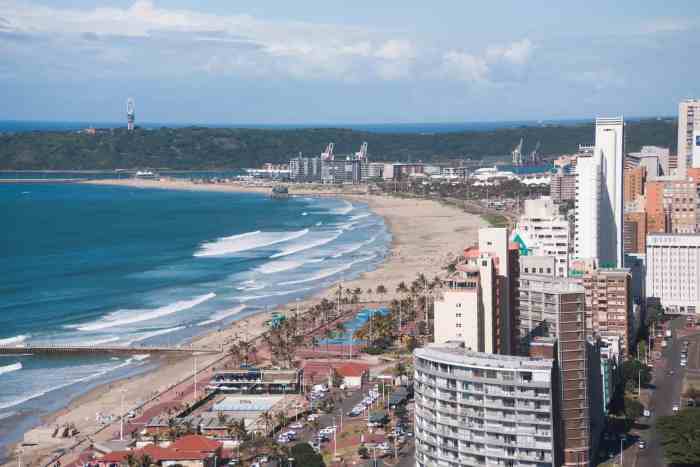
Durban offers a diverse shopping experience, catering to all tastes and budgets. From modern shopping malls to charming boutiques and vibrant local markets, the city has something for every shopper.
One of the most popular shopping destinations in Durban is Gateway Theatre of Shopping, a massive mall with over 400 stores. The mall features a wide range of shops, from high-end fashion boutiques to affordable clothing stores. It also has a large food court, a cinema, and an arcade.
Local Markets
For a more authentic shopping experience, visitors can explore Durban’s many local markets. The Victoria Street Market is a popular choice, offering a wide variety of souvenirs, crafts, and traditional clothing. The market is open daily and is a great place to find unique and affordable gifts.
Another popular market is the Warwick Junction Market, which specializes in fresh produce, spices, and traditional Zulu crafts. The market is open on Saturdays and Sundays and is a great place to experience the local culture.
Souvenirs and Local Crafts
Durban is home to a number of talented artisans who create unique and beautiful souvenirs and crafts. Some of the most popular items include Zulu pottery, beaded jewelry, and wood carvings. Visitors can find these items at local markets, craft shops, and galleries.
One of the most popular souvenirs from Durban is the Zulu pot. These pots are made from clay and are often decorated with intricate designs. They are used for cooking and serving food and are a beautiful addition to any home.
Shopping Areas
The best shopping areas in Durban are:
- Gateway Theatre of Shopping: For a wide range of shops, from high-end fashion boutiques to affordable clothing stores.
- Victoria Street Market: For a more authentic shopping experience, offering a wide variety of souvenirs, crafts, and traditional clothing.
- Warwick Junction Market: For fresh produce, spices, and traditional Zulu crafts.
- Florida Road: For a variety of shops, restaurants, and bars.
- Umhlanga Rocks Drive: For high-end fashion boutiques and luxury goods.
Transportation and Accessibility
Durban is a well-connected city with a range of transportation options available for visitors and locals alike. Getting around the city is relatively easy, and there are convenient connections to other parts of South Africa.
The city’s public transportation system, known as the eThekwini Transport Authority (ETA), operates a network of buses and trains. The buses are reliable and affordable, and they serve most parts of the city. The trains are also a good option, but they are not as frequent as the buses.
Taxis are another popular way to get around Durban. They are relatively inexpensive and can be found at most major transportation hubs.
Rental Cars, Durban holiday
For those who prefer to have their own transportation, rental cars are available at the airport and at several locations throughout the city. Driving in Durban is relatively easy, and there are a number of major highways that connect the city to other parts of South Africa.
Connectivity to Other Parts of South Africa
Durban is well-connected to other parts of South Africa by air, rail, and road. The city’s King Shaka International Airport is a major hub for domestic and international flights. There are also several long-distance train routes that connect Durban to other major cities in South Africa.
By road, Durban is connected to the rest of the country by a network of national highways.
Ultimate Conclusion
Durban’s allure extends beyond its cultural and natural treasures. Its local cuisine is a culinary symphony of flavors, blending Indian, Zulu, and international influences. From bustling street food stalls to fine dining restaurants, Durban’s culinary scene tantalizes taste buds with its aromatic spices and diverse dishes.
Whether you seek adventure or relaxation, Durban caters to every traveler’s desire. Its beaches beckon with golden sands and warm waters, perfect for swimming, surfing, and paddleboarding. Explore the city’s vibrant nightlife, where clubs, bars, and live music venues pulsate with energy.
Uncover Durban’s historical landmarks and heritage sites, including the Old Fort and the KwaMuhle Museum, which narrate the city’s rich past.
Durban Holiday: A Cultural Tapestry and Coastal Paradise is an invitation to immerse yourself in a city that seamlessly blends cultural heritage, natural beauty, and endless possibilities. From its vibrant street art to its pristine beaches, Durban promises an unforgettable holiday experience.
General Inquiries
What is the best time to visit Durban?
The best time to visit Durban is during the summer months, from October to March, when the weather is warm and sunny.
Is Durban a safe city to travel to?
Durban is generally a safe city to travel to, but it is always advisable to take precautions and be aware of your surroundings.
What are the must-visit attractions in Durban?
Some of the must-visit attractions in Durban include the Golden Mile, uShaka Marine World, the Moses Mabhida Stadium, and the Durban Botanic Gardens.
